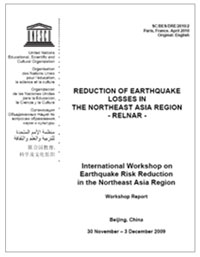Report of Workshop "Earthquake Risk Reduction in the Northeast Asia Region"

Asia has one of the highest levels of seismicity on the planet; it is also the setting for many of the largest earthquakes.
In many Asian countries, disasters caused by natural and environmental hazards continue to exact a heavy toll in terms of the loss of human lives and the destruction of economic and social infrastructure. With population growth in the coastal areas of countries concerned, expanding public and private infrastructure, and continuing trends towards urbanization and industrialization, the risks from great disasters are expected to increase in the coming years and decades.
Since 1999, the United Nations Educational, Scientific and Cultural Organization (UNESCO) and the U.S. Geological Survey (USGS) have been cooperating with scientific and engineering organizations in the South Asia region under the Reduction of Earthquake Losses in the South Asia Region (RELSAR) program. The purpose of the program is to provide a platform for examining regional approaches to improve seismic data and earthquake risk mitigation. A number of collaborative activities have taken place under this initiative; these activities include eight workshops that have been held since the start of the Programme in 1999.
In the interest of initiating cooperation on earthquake data analysis in the Northeast Asia Region, UNESCO is exploring the timeliness, possibility and opportunity of pursuing a cooperative activity on earthquake data analysis which will be jointly promoted by UNESCO and the USGS in the sub-region of North East Asia comprising the Democratic People’s Republic of Korea, Japan, Mongolia, People’s Republic of China, the Republic of Korea, and the Russian Federation. Beyond their scientific value and merit, these programmes offer a forum for scientists and engineers from various countries presenting a diversity of contexts to work together under UNESCO’s umbrella and discuss regional approaches to improve collaboration in earthquake data exchange and analysis. The first step in this planned effort was to hold an international workshop in China, hosted by the China Earthquake Administration, under the aegis of UNESCO, in cooperation with the USGS.
This report presents the results of the first meeting of the Northeast Asia sub-regional workshop held in November-December 2009 in Beijing, China.
Related links:
:: "Earthquake Risk Reduction in the Northeast Asia Region" Workshop Report [.pdf]
- Source:UNESCO SC
- 11-05-2010

